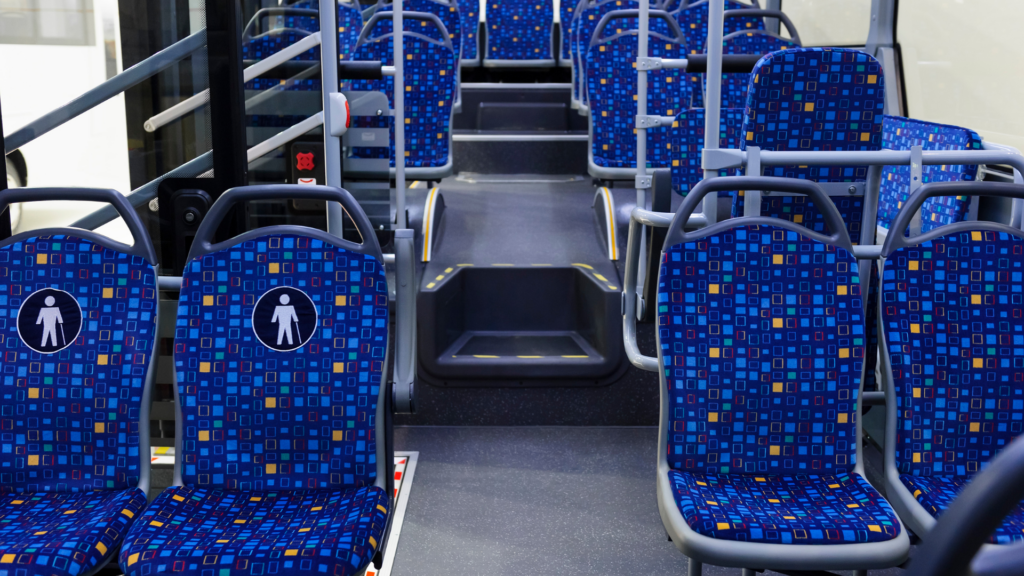Transportation, Planning and Development Committee: August 7, 2023

Bus seats
The Charlotte Transportation, Planning & Development Committee held their latest meeting on Monday, August 8, 2023. Only two items were on the agenda: updates regarding Charlotte Area Transportation System (CATS) and the Unified Development Ordinance (UDO). Here are the highlights:
CATS update
CATS CEO Brent Cagle reprised his report from the Metropolitan Transit Commission (MTC) meeting on July 26. You can get all the details in our blog post covering that meeting. The only new piece of information was about another recent derailment in the maintenance yard, which happened on July 28. The train was not in service at the time and nobody was on board.
UDO update
Charlotte Planning, Design, and Development Director Alyson Craig shared information about four in-progress items:
Text amendments
- Text amendment 2023-093 would allow existing dwellings in commercial zonings (CG and OFC) to be conforming so owners can make changes to their homes.
- Status: a public hearing was held on July 17 and City Council will make a decision on August 21
- Text amendment 2023-106 would allow multi-family uses in commercial zonings.
- Status: a public hearing will be held in September or October and City Council will make a decision in October or November
- An unfiled amendment would clarify which uses are permitted in the campus zoning district and create a General Office zoning.
- Status: this amendment is expected to be filed in September with a public hearing in late fall and city council decision in early winter
Here’s our take on the proposed amendments.
Council referral from May 22, 2023
- The Planning Department is considering a proposed text amendment that would restrict the number of duplexes and triplexes in a subdivision development. Specifically, if a development consists entirely of duplexes or triplexes, these types of housing units would be limited to a maximum of 70% of the total development. The remaining 30% of the development would consist of single-family homes located along the edge of the property, adjacent to any existing single-family homes.
- The Planning staff is currently deliberating on whether to apply the new rule based on the project’s overall size, the number of structures, units, or parcels, or the location and condition of the site.
- Next steps: Planning staff will review and test existing and prototype sites, elicit feedback from the UDO Advisory Committee, and develop a recommendation for TP&D committee consideration.
Tree canopy analysis
- The results of the tree canopy analysis (2018-2022) will be available this fall.
- Information will include county and council district data, neighborhood profiles, land ownership, and place types. A Tree Canopy StoryMap will also be available.
- This data will inform the 2024 Urban Forestry Master Plan update and might inform future policies and programmatic initiatives.
Streets manual update
- The Streets Manual is a companion document of the UDO. It outlines street design requirements for right-of-way protection and infrastructure for private development.
- Charlotte Department of Transportation (CDOT) staff recommends three amendments:
- Establish a process for amendments to street design and type.
- Include additional infrastructure mitigation options for development.
- Determine a process for consideration of reduced parking requests.
- The amendments will be available for public comment on September 25 and will go before City Council for adoption on October 9.
- Learn more about speaking at a public comment session and sign up here
- Director of Operations for CDOT Ed McKinney clarified that traffic thresholds in urban areas will be reduced to prioritize multi-modal investments.
Our take
No action was taken at this meeting, but a few important points were made, including the Planning staff’s focus on mixed-use development and CDOT’s prioritization of multi-modal investments. Both of these elements are critical to creating a walkable community. It is these meaningful shifts away from reliance on cars that will lead us toward a healthier, safer, and more climate-friendly Charlotte.
Want the details? Check out the meeting agenda here and the video recording here (beginning to 1:05:00).
Thanks for reading!
As a nonprofit, community support is essential for us to keep doing what we do — including providing free articles like this. If you found this article helpful, please consider supporting Sustain Charlotte.
Want to stay in the loop? Subscribe to our weekly newsletter and follow us on Instagram, Facebook, and Twitter.
